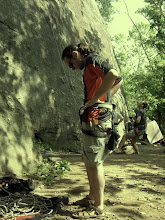Back to back interesting articles. This article is about energy. Specifically, it's about solar energy.
You see, a few problems exist with energy from water. First off, a water molecule is pretty hard to split, so it requires a bit of energy to be put into the system. Second, the yield is usually greatly less than the energy put into the system due to entropy. Enter the story, and a great deal of hope (at least for me).
A U.S. scientist has developed a new way of powering fuel cells that could make it practical for home owners to store solar energy and produce electricity to run lights and appliances at night.
A new catalyst produces the oxygen and hydrogen that fuel cells use to generate electricity, while using far less energy than current methods.
With this catalyst, users could rely on electricity produced by photovoltaic solar cells to power the process that produces the fuel, said the Massachusetts Institute of Technology professor who developed the new material.
Here is another link with a little more of a description.
So, MIT researchers discovered a nearly 100% efficient way, using a catalyst, to split water and save the energy. Chalk up one to science! The other benefit is that the way to do it doesn't involve destroying the environment around it. It's environmentally friendly. And, it is a really really good way to store photovoltaic energy as a result.
So, for the big picture, photovoltaics yield energy. Super scientist guys add a cobalt phosphate catalyst to water, and use that photo-energy-rificness to put an electric charge across the water, splitting the water, and using Platinum to bond with the Hydrogen and store it, and the allowing the cobalt phosphate to bond with the Oxygen. Then, when the current is removed (i.e., the Sun goes down), the separated components recombine into water and release almost 100% of the energy used to create the separation.
Ultimately, this is a good way to store solar power during the day and release it at night. Rock on, Sun! And the über-awesomeness award to MIT for figuring this one out.

